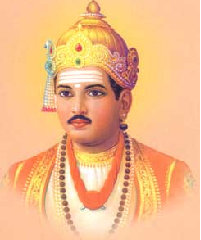Basava also known as Basavanna was born in 1134 AD to a Shaiva Brahmin couple Madarasa and Madalambike in Bijapur district, Karnataka, India.
Basava is a man ahead of his time that was against casteism and untouchability. He strongly believed in “work is worship” principle, social equality and resolving conflicts through debate and not by violence. He is well known for his ideological spiritual preaching and his progressive revolutionary thoughts towards human well-being of society in the early 12th century AD.
 Basava’s childhood
Basava’s childhood
In the early centuries, people were rigidly bound to religious traditions. Based on these traditions, rituals and conventions, people lost their sight. People forgot that there is only one God. Blind faiths and beliefs among people laid down a foundation of caste system. Basavanna left his parents at the age of 12 years and went to kudalasangama for studies.
Basava did not believe in rituals and he denied his family custom (Upanayana ceremony). This bold decision taken by him at the younger age amazed everybody.
Basava’s philosophy and teachings
Basava’s mission was the formation of a new society where all individuals are considered equal irrespective of caste, creed, profession, gender, etc. He established Anubhava Mantapa, a spiritual enlightenment center run on certain noble principles. Below are some of the major take-aways of his philosophy and teachings:
- There is only one God in the universe and he has many names.
- Treat all living beings with mercy and kindness. Live for the welfare of all people and not for self-interests.
- Taught people of simple living
- One should not have food and water to please the tongue. It should be taken as a ‘prasada’
- All people should take up a fair and honest means of livelihood. Of the daily earnings, one should take only the needed for the maintenance of the family and the rest should be offered to the benefit of others in the way of service
- The dignity of manual labour lies in the work we do. Every kind of manual labour who looked down by high caste people should treat them with love and reverence. Thus, arts and crafts flourished in the history of economics of the land.
- Birth and religious formalities does not determine the greatness of a person. It is through right conduct that a person becomes great.
- Man should do work from his true heart and as a devotion. It should never be for the sake of publicity or to win the public praise.
- To attain or live a spiritual life, people need not give up the family bonding and become a monk. They can also lead a proper life as householders.
- Everyone should have equal opportunities for religious life.
- Believed that one’s own awareness is a good teacher
- He also believed that conflicts should be resolved through debate and not by violence
Basava’s great works
Some great works and ideologies of Basava are:
- Rejected traditional rituals and practices based on religious scriptures called Agamas, Shastras and Puranas strictly following by society in the early centuries
- Fought against castism for eradicating untouchability and establish equality among all human beings
- Believed in “Work is Worship” principle i.e., Work puts you on the path to heaven
- Emphasized on welfare and human well-being of the society
- He established Anubhava Mantapa with his own income at Kalyana (presently known as Basavakalyana, a town in Bidar district, Karnataka)
- Anubhava Mantapa is a spiritual place that gave equal proportion to men and women, which attracted many saints from throughought the India
- His path led to Lingayatism religion founded for uncared ones including everyone from high class to the untouchables for bringing them social justice.
Qualities of Basava
Some qualities of Basava that played major role in making him a greatest social reformer are:
- He studied several books with devotion to acquire knowledge in various subjects. He believed studying is worshipping God.
- His sincerity, devotion, modesty and good behavior made him the beloved of all
- His scholastic personality in various subjects helped him get an offer in the court of King Bijjala of Kalyani Chalukya.
- With his honesty, hard work and visionary mission, Basava became Prime Minister in the court of king Bijjala, who ruled from 1162—1167 at Kalyana (presently renamed Basavakalyana).
Basava introduced the concept of Ishtalinga
Basavanna explained, there is no shape and form of a God. There is only one God-real, noble and supreme in the Universe. He is always there to help the true devotees as no other God could attain dignity as Shiva whom Basavanna worshipped in the form of Linga (symbol of infinity).
He didn’t just teach but really practiced by all the members of Anubhava Mantapa in their daily life. Thus, Basava is a man who practiced what he preached in his life.
